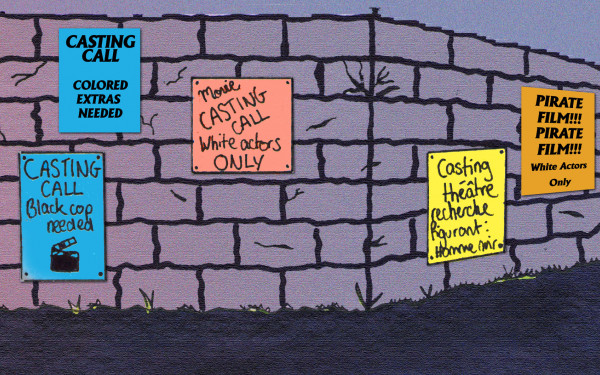Antigone à la Montréalaise
Concordia’s Theatre Department Takes Sophocles’ Antigone to the Metro
Known as one of the best dramatic plays ever written, Sophocles’ Antigone captures something essential about human nature and the power of the state. Although it was written as early as 441 BC, Sophocles’ message is still on point, as the play presents civil disobedience as a moral responsibility while denouncing the dangers of having an autocratic leader.
Antigone takes place in Ancient Greece and tells the story of a young woman who has just lost her two brothers in the Theban civil war. Her uncle, the king Creon, has decided to honour one of the brothers with a traditional burial ceremony while the other, thought to have been attacking the city, must be left to rot on the battlefield. Antigone challenges this decree and claims the latter brother deserves a traditional mourning as well, despite what the law may proclaim.
Director Andreas Apergis strives to make the public connect with the issues in this play by setting this classical Greek tragedy in modern-day Montreal. Although the text has been kept the same, the set and costumes have been modified to represent a post-apocalyptic society that has grown in Montreal’s underground metro.
Apergis has worked as an actor, director and translator in French and English for more than 20 years, but this is his first time collaborating with the Concordia Theatre Department.
“He came in with very strong ideas,” said costume designer Zoe Roux. “He had a clear vision of a dystopian society living in a modern day metropolis.”
The designers’ main responsibility was to create a fictional but identifiable world the audience could relate to. “Changing the setting allows us to explore different kinds of aesthetics by using a central story and seeing how the themes exist outside of Ancient Greece,” explained Evan Stepanian, a sound designer, music composer and performer in the production. This technique enables the public to imagine themselves in the place of the characters more easily.
Changing up the setting was a huge challenge for the designers, as they had to create an entire world. As Roux explained, they had to construct everything emotionally because they couldn’t fall back on historical research. Creating this work took a lot of collaboration between the different designers, as it was crucial that all of their individual designs produce a cohesive whole.
“I did a lot of visual research,” said Roux, who found inspiration in things as seemingly unrelated as the current conflict in Syria.
“It’s tricky because you can reference eras but it’s all about making conscious choices, such as which era you want to represent and why.” Roux’s concern is a legitimate one: using ideas from specific totalitarian regimes might make overly strong suggestions, whereas being too vague could prevent the audience from imaging themselves within the story.
“To make it more modern we played a lot with the idea of surveillance, not in the text but in the design. We wanted it to resonate within people,” Stepanian added. Other themes were explored by the designers, such as the separation between spirituality and the law—which is a huge part of Antigone, whose character’s namesake is fighting for the laws of the gods against the laws of Creon.
Leilani Fraser-Buchanan, who will portray Antigone, points out that “while the setting may be futuristic, the story itself is timeless.” For the actress, having the play in a modern setting makes the story more immediate. While people tend to see classical texts as intimidating, creating a more contemporary environment breaks down barriers and enables them to connect better to the issues.
We can all relate to love, to grief, to pride, and Sophocles speaks to these basic human tendencies. He portrays the tragedy of being in a world that we can’t control by showing us the discrepancy between how we expect others to interpret our actions and how they actually interpret them.
“If the text hasn’t been changed,” Fraser-Buchanan said, “it’s because these are human issues. If we do the characters and the story justice, people will connect to it.”
The Theatre and Development program at Concordia has been advocating for socially engaged art over the course of the entire school year. Despite the centuries that have passed since its debut, Antigone’s political message is still accurate in our current system.
Sophocles denounces the oppression of a controlling government in which citizens have no say. This type of censorship has not disappeared even in our democratic societies and Antigone reminds us all about the importance of dissidence.
Sophocles empowers us with ideas of political responsibility and plays questioning the nature of destiny, by showing us how people confront their faith and the tragic results that occur when they fail in controlling it. Setting Antigone in a near future creates a context where the public can imagine themselves facing the same sort of issues and inevitably end up feeling closer to the characters. Such questions are strikingly relevant and will certainly leave you thinking.

_900_582_90.jpg)
_600_832_s.png)




__600_375_90_s_c1.jpg)